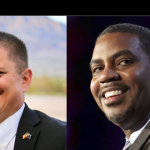After two years of COVID policies that destroyed small businesses, forced people out of their jobs, and placed our students behind in math and reading, a columnist for The Atlantic has the temerity to suggest that people should just forgive and forget what the COVID regime did to everyday Americans. The very idea sounds insane to those who saw and experienced the tyranny that local, state, and federal governments carried out for a virus that has a 99 percent survival rate.
Emily Oster, an economics professor at Brown University, wrote a piece in which she makes the case for a “pandemic amnesty,” and argues that Americans “need to forgive one another for what we did and said when we were in the dark about COVID.”
The author begins her article by recalling how her family struggled with the coronavirus and efforts to limit its spread. She discusses how, when hiking with her family, they wore cloth masks and practiced social distancing, not knowing that none of these measures were necessary.
“These precautions were totally misguided. In April 2020, no one got the coronavirus from passing someone else hiking. Outdoor transmission was vanishingly rare. Our cloth masks made out of old bandanas wouldn’t have done anything, anyway. But the thing is: We didn’t know,” she wrote.
Oster acknowledged that many of the decisions made by government officials were ineffective:
Some of these choices turned out better than others. To take an example close to my own work, there is an emerging (if not universal) consensus that schools in the U.S. were closed for too long: The health risks of in-school spread were relatively low, whereas the costs to students’ well-being and educational progress were high. The latest figures on learning loss are alarming. But in spring and summer 2020, we had only glimmers of information. Reasonable people–people who cared about children and teachers–advocated on both sides of the reopening debate.
Of course, an article like this wouldn’t be complete without taking a jab at folks on the right over supposed “misinformation.” She noted that there were missteps, “Some people intended to mislead and made wildly irresponsible claims.”
“Remember when the public-health community had to spend a lot of time and resources urging Americans not to inject themselves with bleach?” she wrote.
Oster was referencing the story in which the activist media falsely claimed former President Donald Trump told Americans to go into their laundry rooms, grab a bottle of bleach, pour it into a syringe, and inject it into their veins. While his words during that press conference weren’t exactly as clear as they could have been, it was pretty obvious he was suggesting no such thing.
The author then makes the laughable claim that misinformation is still “a huge problem,” but that “most errors were made by people who were working in earnest for the good of society.”
Oster goes on to insist that “getting something wrong wasn’t a moral failing” and that “[w]e have to put these fights aside and declare a pandemic amnesty.”
“We can leave out the willful purveyors of actual misinformation while forgiving the hard calls that people had no choice but to make with imperfect knowledge,” she wrote.
We can all guess to whom Oster is referring when she brings up “willful purveyors of actual misinformation,” right?
She is not talking about those who continued to insist that masks be worn everywhere even after evidence emerged showing they were about as effective as filling up a pool with an eyedropper. The author certainly wasn’t referring to folks who pushed policies requiring people to take a vaccine that did not live up to their promises or lose their jobs. I doubt she would take issue with politicians who shut down churches and restaurants while leaving open liquor stores and big box companies.
Nope.
It’s those people who questioned the Democrat-approved narrative regarding the pandemic and vaccines who are the true mustache-twirling villains in this epic tale. People like podcaster Joe Rogan are to blame for platforming medical professionals who cast doubt on the efficacy of vaccines and promoted early treatment, which could have saved numerous lives if they weren’t hampered and downplayed by the White House and Democrats.
Even further, I wonder if she would be willing to tell the small business owner, whose livelihood went under because of onerous COVID restrictions while major companies benefitted from the PPP loans that these people were supposed to have. Would she have the gall to assert that those who were unable to see their loved ones before they passed?
What about these people who chimed in on Twitter:
What America needs is not pandemic amnesty. It needs accountability. The politicians and leaders who employed the measures that resulted in these tragedies need to face consequences, full stop. We can’t get to forgiveness if there is no accountability and repentance.
But folks like Oster know this is not going to happen. The people she supported in their efforts to use the pandemic to get the state more involved in our lives will never meet justice. Indeed, the only evil people in this equation are people who expressed opinions with which she disagreed. In the end, her piece was nothing more than a pretty way of saying: “It happened. Get over it.”


